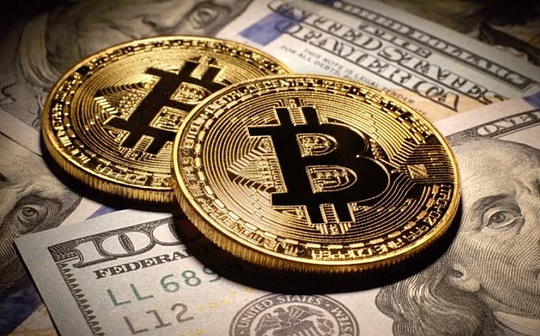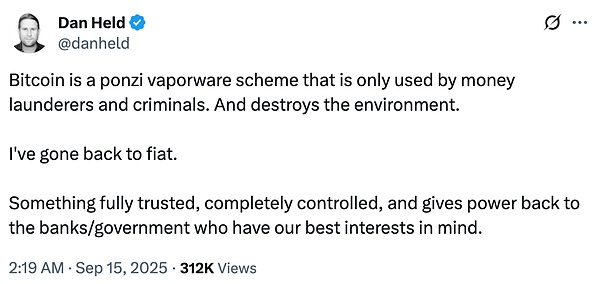
Early this morning, BTC investor and marketing director of Kraken Exchange Dan Held posted a post that was very different from his previous position:

Translate:
“Bitcoin is the air software of Ponzi schemes, which is only used by money launderers and criminals, and can also damage the environment.
I have returned to the fiat currency system.
The fiat currency is fully trustworthy and fully controlled, and returns power to banks and governments that always focus on our interests.”
As soon as the post was released, many netizens, especially his fans, were dumbfounded and didn’t know which one he played.
Someone carefully asked: This should be a post posted on April Fool’s Day on April 1st?
But take a look at the calendar.It is September 15, 2025 now.Not April Fool’s Day.
Looking at this post, this expression, and this tone, if it is placed on Zhihu platform, it will definitely be an IQ appraisal post that makes it difficult to distinguish between enemies and friends at a glance – whether it is really a surrender to enemies or a friendly army cross-travel fishing.
Putting it on this X makes people a little confused.
No matter whether he is an enemy or a friend, let’s have a grand funeral first.
However, at any time, there are always people who turn to fans and some fans turn to black. It’s not surprising and it’s accustomed to them.
Who doesn’t transfer BTC if it is gone?
Satoshi Nakamoto has retired for so many years, but hasn’t BTC still successfully increased from being a mere article to more than 100,000 yuan per piece now?
As for those unrefutable views, even input into AI (without any additional tips), AI will refute them with reasonable grounding:
“I understand that you have major concerns about Bitcoin, and that cryptocurrencies have indeed been used for illegal activities and have environmental impacts. But it should be noted:
1. Although Bitcoin has involved illegal transactions, most activities are legal.Blockchain technology creates permanent public records, which instead enhances transaction transparency
2. Environmental problems are being gradually solved through renewable energy mining and efficiency improvement technologies. Many mines have used abandoned energy (otherwise it will be wasted electricity)
3. The fiat currency system also has significant environmental costs, including banking infrastructure and energy consumption in traditional financial systems.
4. The centralized system itself has potential problems such as inflation risks, censorship systems and relying on institutional decision-making.
Both systems have their pros and cons, and rational choice depends on different preferences for money and store of value.Ideal solutions may require a balance between efficiency, security and accessibility by integrating the advantages of traditional and innovative systems.”
It is hard to imagine that even AI has a certain consensus on the value of BTC today, and there are still veteran investors who will choose to get out of the market themselves.
Teaching Link remembers that after Taleb cleared BTC a few years ago, he even wrote a paper saying “Bitcoin Black Book”, trying to use academic language to prove that the value of BTC is zero.
Several years have passed, and BTC has not only not returned to zero, but has also doubled.
Perhaps it is the psychological theory of cognitive dissonance that is playing a huge role.No one, even an expert, can overcome it with reason.
According to this theory, people will do the following irrational self-brainwashing:
1. Post-Decision Rationalization
If investors choose to clear their positions under the influence of Bitcoin price fluctuations or negative news.If the price of Bitcoin rises after selling, a conflict of “I’m wrong”.Under the contradiction between regret of losing profits and the original intention of avoiding risks, cognitive dissonance occurs.Increasing psychological pressure will force investors to rationalize their original clearance decisions, such as:
Emphasize the rationality of risk aversion: “I saved my principal and avoided a plunge” (even if it did not actually plunge).
Degrading the value of Bitcoin: “BTC is simply a bubble, and it will return to zero sooner or later” or “blockchain has no practical value.”
Amplify negative information: pay more attention to news such as regulatory suppression and hacker incidents, and ignore positive signals.
2. Effort Justification
If investors have invested a lot of time/money to study Bitcoin (such as learning technology, tracking the market), clearance will conflict with the effort.Cognitive dissonance will allow investors to rationalize their clearance decisions in their hearts:
“This experience has made me see the dangers of the speculative market and I will be more cautious in the future” (seeing clearance as the “growth price”).
“Although I lost money, I learned valuable lessons” (using cognitive gains to make up for financial losses).
3. Change the original attitude (Attitude Change)
If investors are originally optimistic about Bitcoin but are forced to clear their positions (such as urgently needing money or panic selling).Action (sell) and belief (long-term bullish) directly conflict, forming cognitive dissonance. At this time, investors will make the following rational explanations or self-comfort in their hearts:
Negate the original belief: “Bitcoin is not ‘digital gold’ at all, it is just a high-risk asset.”
Turn to a new goal: “Fire currency is more stable” or “gold is the real hedging tool” (such as quoted by Peter Schiff to prove it).
4. External Attribution
If the investor continues to rise after clearing the position, the investor may attribute the responsibility to external factors.At this time, cognitive dissonance will cause rationalized psychological activities to emerge in investors’ hearts:
“The market is manipulated, retail investors can never win”
“Federal policy is abnormal and destroys market laws”
“Media/experts misled me” (rather than admitting one’s own misjudgment).
The theory of cognitive dissonance reveals a problem: humans really need to maintain self-consistent.Or in other words, humans really can’t accept the result of “I was wrong”.Understanding this point can not only be vigilant about one’s own psychological traps, but also look at other people’s investment choices more rationally.
Record decision-making logic and operate according to discipline; maintain diverse sources of information and actively contact the opposite viewpoints; accept market uncertainty and acknowledge the limitations of one’s own cognitive. These methods all help to avoid one’s heart being dominated by cognitive dissonance and avoid over-rationalizing decision-making mistakes.
Maybe you will feel that your heart is always your friendly.But in the financial market, your own heart often becomes your biggest enemy.
By improving your cognitive level to the level of being able to be self-aware in a timely manner, you will often be able to discover the moment you betray yourself and decisively bury your friendly forces.






